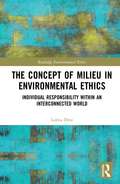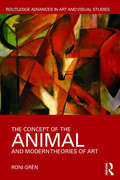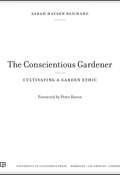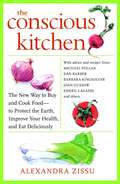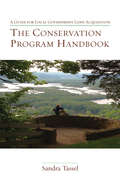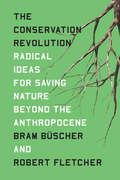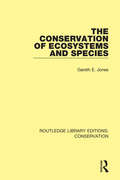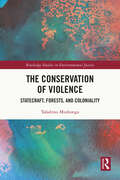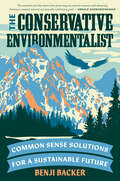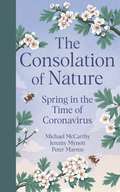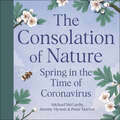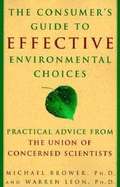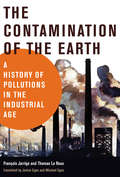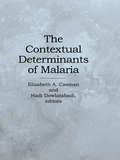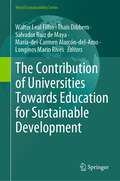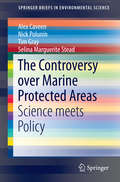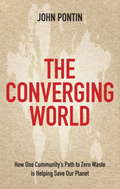- Table View
- List View
The Concept of Milieu in Environmental Ethics: Individual Responsibility within an Interconnected World (Routledge Environmental Ethics)
by Laÿna DrozThe Concept of Milieu in Environmental Ethics discusses how we can come together to address current environmental problems at the planetary level, such as climate change, biodiversity loss, transborder pollution and desertification. The book recognises the embedded individual sociocultural and environmental contexts that impact our everyday choices. It asks, in this pluralism of worldviews, how can we build common ground to tackle environmental issues? What is our individual moral responsibility within the larger collaborative challenge? Through philosophical reasoning, this book pragmatically addresses these questions and builds a framework to support sustainable ways of living. At the core of the book, it draws on the concept of milieu (fūdo) inspired by the Japanese philosopher Watsuji Tetsurō, which captures how we act within and perceive our surroundings as a web of culturally, historically and geographically situated meanings and values. It argues that the milieu connects us as individuals with community, past and future history, and the natural world, providing us with common ground for global environmental ethics. This book will be an engaging and interesting read for scholars, researchers and students in environmental ethics, philosophy and sustainability.
The Concept of the Animal and Modern Theories of Art (Routledge Advances in Art and Visual Studies)
by Roni GrénThis book examines the importance of the animal in modern art theory, using classic texts of modern aesthetics and texts written by modern artists to explore the influence of the human-animal relationship on nineteenth and twentieth century artists and art theorists. The book is unique due to its focus on the concept of the animal, rather than on images of animals, and it aims towards a theoretical account of the connections between the notions of art and animality in the modern age. Roni Grén’s book spans various disciplines, such as art theory, art history, animal studies, modernism, postmodernism, posthumanism, philosophy, and aesthetics.
The Conquest of the Russian Arctic
by Paul R. JosephsonSpanning nine time zones from Norway to the Bering Strait, the immense Russian Arctic was mostly unexplored before the twentieth century. This changed rapidly in the 1920s, when the Soviet Union implemented plans for its conquest. The Conquest of the Russian Arctic, a definitive political and environmental history of one of the world's remotest regions, details the ambitious attempts, from Soviet times to the present, to control and reshape the Arctic, and the terrible costs paid along the way. Paul Josephson describes the effort under Stalin to assimilate the Arctic into the Soviet empire. Extraction of natural resources, construction of settlements, indoctrination of nomadic populations, collectivization of reindeer herding--all was to be accomplished so that the Arctic operated according to socialist principles. The project was in many ways an extension of the Bolshevik revolution, as planners and engineers assumed that policies and plans that worked elsewhere in the empire would apply here. But as they pushed ahead with methods hastily adopted from other climates, the results were political repression, destruction of traditional cultures, and environmental degradation. The effects are still being felt today. At the same time, scientists and explorers led the world in understanding Arctic climes and regularities. Vladimir Putin has redoubled Russia's efforts to secure the Arctic, seen as key to the nation's economic development and military status. This history brings into focus a little-understood part of the world that remains a locus of military and economic pressures, ongoing environmental damage, and grand ambitions imperfectly realized.
The Conscientious Gardener
by Peter Raven Sarah Hayden ReichardIn his influential A Sand County Almanac, published at the forefront of the environmental movement in 1949, Aldo Leopold described a new ecological ethic to guide our stewardship of the planet. In this inspiring book, Sarah Hayden Reichard tells how we can bring Leopold's far-reaching vision to our gardens to make them more sustainable, lively, and healthy places. Today, gardening practices too often damage the environment; we deplete resources in our own soil while mining for soil amendments in far away places, or use water and pesticides in ways that can pollute lakes and rivers. Drawing from cutting edge research on urban horticulture, Reichard explores the many benefits of sustainable gardening and gives straightforward, practical advice on topics such as pest control, water conservation, living with native animals, mulching, and invasive species. The book includes a scorecard that allows readers to quickly evaluate the sustainability of their current practices, as well as an extensive list of garden plants that are invasive, what they do, and where they should be avoided.
The Conscious Kitchen: The New Way to Buy and Cook Food - to Protect the Earth, Improve Your Health, and Eat Deliciously
by Alexandra ZissuYour everyday food choices can change the world--and make meals taste better than ever For anyone who has read The Omnivore's Dilemma or seen Food, Inc. and longs to effect easy green changes when it comes to the food they buy, cook, and eat, The Conscious Kitchen is an invaluable resource filled with real world, practical solutions. Alexandra Zissu walks readers through every kitchen-related decision with three criteria in mind: what's good for personal health, what's good for the planet, and what tastes great. Learn, among other things, how to: - Keep pesticides, chemicals, and other harmful ingredients out of your diet- Choose when to spend your dollars on organic fruit and when to buy conventionally grown- Avoid plastic--including which kinds in particular and why- Figure out what seafood is safe to eat and is sustainable- Use COOL (country of origin labels) to your advantage- Determine if a vegetable is genetically modified just from reading its PLU (price look up) code- Decipher meat labels in the supermarket- Cook using the least energy--good for the earth and your wallet- Eat locally, even in winter - Understand what "natural" and other marketing terms really mean- Buy packaged foods wisely Navigate farmers' markets, giant supermarkets, and every shop in between to find the freshest and healthiest local ecologically grown and produced meat, dairy, fruits, and vegetables--no matter where you live With The Conscious Kitchen as your guide, you will never again stand in the market bewildered, wondering what to buy. You can feel confident you are making the best possible choices for you, your family, and our planet. ALEXANDRA ZISSU writes about green living, food, and parenthood. She is the author of The Conscious Kitchen, coauthor of The Complete Organic Pregnancy, and contributes the "Ask an Organic Mom" column to The DailyGreen.com. Her stories have appeared in The New York Times, The Green Guide, Cookie, Details, Bon Appétit, Self, and Health, among other publications. She is also a public speaker and "greenproofer," an eco-lifestyle consultant. Visit her website, www.alexandrazissu.com.
The Conservation Program Handbook: A Guide for Local Government Land Acquisition
by Sandra TasselBetween 1996 and 2007, voters approved almost $24 billion for local government park, open space, and other conservation purposes. Despite this substantial sum for land protection, there was at that time no book available to guide officials as they implemented voters' mandates. The Conservation Program Handbook was written in response to numerous requests to The Trust for Public Land for exactly this type of guidance from community leaders who wanted to know how to effectively conserve their iconic landscapes. In addition, in November 2008, despite massive doses of terrible financial news, voters across the U.S. approved land conservation funding measures. It was a record-breaking year for land protection financing, with voters demonstrating substantial support for open space ballot measures despite the economic and fiscal crisis of the time. The Conservation Program Handbook is a manual that provides all of the information--on a broad spectrum of topics--that conservation professionals are likely to encounter. It compiles and distills advice from professionals based on successful conservation efforts across the country, including a list of "best practices" for the most critical issues conservationists can expect to face. By providing information on how to do conservation work in the best possible manner, The Conservation Program Handbook has the goal of increasing the amount, quality, and pace of conservation being achieved by local governments throughout the nation.
The Conservation Revolution: Radical Ideas for Saving Nature Beyond the Anthropocene
by Robert Fletcher Bram BuscherA post-capitalist manifesto for conservationConservation needs a revolution. This is the only way it can contribute to the drastic transformations needed to come to a truly sustainable model of development. The good news is that conservation is ready for revolution. Heated debates about the rise of the Anthropocene and the current &‘sixth extinction&’ crisis demonstrate an urgent need and desire to move beyond mainstream approaches. Yet the conservation community is deeply divided over where to go from here. Some want to place &‘half earth&’ into protected areas. Others want to move away from parks to focus on unexpected and &‘new&’ natures. Many believe conservation requires full integration into capitalist production processes. Building a razor-sharp critique of current conservation proposals and their contradictions, Büscher and Fletcher argue that the Anthropocene challenge demands something bigger, better and bolder. Something truly revolutionary. They propose convivial conservation as the way forward. This approach goes beyond protected areas and faith in markets to incorporate the needs of humans and nonhumans within integrated and just landscapes. Theoretically astute and practically relevant, The Conservation Revolution offers a manifesto for conservation in the twenty-first century—a clarion call that cannot be ignored.
The Conservation of Ecosystems and Species (Routledge Library Editions: Conservation #3)
by Gareth E. JonesOriginally published in 1987, Conservation of Ecosystems and Species examines conservation as a major world issue for governments, industrialists and the general public. The need for conservation has become more urgent as human activity continues to encroach upon the remaining natural ecosystems of our planet. This book examines a wide range of conservation issues and explains the scientific reasons why conservation of ecosystems and species is important, not merely for its own sake, but for the future of humanity. It charts the development of conservation policy around the concept and understanding of the ecosystem. The roles of the planner, the industrialist and the politician in the development of a conservation policy are described.
The Conservation of Violence: Statecraft, Forests, and Coloniality (Routledge Studies in Environmental Justice)
by Tafadzwa MushongaThe Conservation of Violence explores the governance of protected forests in Zimbabwe, highlighting the structural and operational mechanism through which violent tactics are produced, employed, and sustained to promote nature conservation. Drawing on political ecology, geography, and environmental politics, it examines the central role of the state in conserving conservation violence. The book presents contemporary cases studies of violence in conservation and introduces the concept of conservation of violence as an alternative framework for understanding the tenacity of violence in conservation areas across Africa. It also delves into the constitutionalisation of environmental rights, illustrating how these rights have been leveraged to enable and preserve conservation violence, as well as the ways in which militarisation fosters and circulates violence. By offering new ways for investigating violence in conservation, the book interrogates the complexities of dismantling entrenched systems of violence and provides insights into the theoretical and practical obstacles of transforming conservation ideologies. The explored include coloniality, nature-culture dichotomies, resource governance, extraction, capitalism, sustainability, policy and conservation law, regulation and policing, environmental rights, and environmental justice. The Conservation of Violence will be a significant contribution to the fields of political ecology, geography, development, environmental justice, and the broader environmental humanities.
The Conservative Environmentalist: Common Sense Solutions for a Sustainable Future
by Benji BackerA young, conservative environmentalist provides an intrepid vision for both solving our climate crisis and prioritizing the American national interest.Politicians, pseudo-experts, and other partisans have led us to believe that there are only two approaches to climate change: doomerism or denial. Benji Backer, Founder and Executive Chairman of the American Conservation Coalition, argues that both are dead ends. In The Conservative Environmentalist, he delivers an entirely new strategy to take care of the planet while putting put the economic interest of the American people first. Backer makes the compelling case that conservative principles are the key to climate solutions that actually work. In this book, you&’ll visit the country&’s most diverse ecosystems and consequential manufacturing hubs—from Utah coal mines and Texas oil fields to Louisiana wetlands and Rhode Island offshore wind farms—witnessing the power of individual entrepreneurship and local problem-solving. You&’ll be inspired by groundbreaking efforts to strengthen earth&’s ecosystems (that Green New Dealers and other Big Government advocates would prefer to keep hidden), like partnerships between oil and gas companies and environmental nonprofits to preserve thousands of acres of wetlands. Drawing on cutting-edge science, a deep understanding of local community needs, and his experience rallying politicians on both sides of the aisle to take action, Backer offers hope for everyone who cares about the state of the great outdoors. Fascinating, clear-headed, and full of surprises, The Conservative Environmentalist is the fresh, audacious approach needed to ensure a sustainable future, and particularly one that works for America.
The Consolation of Nature: Spring in the Time of Coronavirus
by Jeremy Mynott Peter Marren Michael McCarthyONE OF THE GUARDIAN'S BEST NATURE BOOKS OF 2020SHORTLISTED FOR THE RICHARD JEFFERIES SOCIETY & WHITE HORSE BOOKSHOP LITERARY PRIZE'Lovely: full of fascinating detail and anecdote, but the undertow of the virus moving in real time beneath its sunlit surface gives it a unique emotional heft.'-The Times'A literary window into the wonderful wild world during lockdown... a charming book.'-Daily Mail'An entrancing testament to nature's power to restore us to ourselves.'-Ruth PadelNature took on a new importance for many people when the coronavirus pandemic arrived, providing solace in a time of great anxiety - not least because the crisis struck at the beginning of spring, the season of light, growth, rebirth and renewal.Three writers, close friends but living in widely separated, contrasting parts of the country, resolved to record their experiences of this extraordinary spring in intimate detail, to share with others their sense of the wonder, inspiration and delight the natural world can offer.The Consolation of Nature is the story of what they discovered by literally walking out from their front doors.
The Consolation of Nature: Spring in the Time of Coronavirus
by Jeremy Mynott Peter Marren Michael McCarthyONE OF THE GUARDIAN'S BEST NATURE BOOKS OF 2020SHORTLISTED FOR THE RICHARD JEFFERIES SOCIETY & WHITE HORSE BOOKSHOP LITERARY PRIZE'Lovely: full of fascinating detail and anecdote, but the undertow of the virus moving in real time beneath its sunlit surface gives it a unique emotional heft.'-The Times'A literary window into the wonderful wild world during lockdown... a charming book.'-Daily Mail'An entrancing testament to nature's power to restore us to ourselves.'-Ruth PadelNature took on a new importance for many people when the coronavirus pandemic arrived, providing solace in a time of great anxiety - not least because the crisis struck at the beginning of spring, the season of light, growth, rebirth and renewal.Three writers, close friends but living in widely separated, contrasting parts of the country, resolved to record their experiences of this extraordinary spring in intimate detail, to share with others their sense of the wonder, inspiration and delight the natural world can offer.The Consolation of Nature is the story of what they discovered by literally walking out from their front doors.
The Consolation of Nature: Spring in the Time of Coronavirus
by Jeremy Mynott Peter Marren Michael McCarthyNature took on a new importance for thousands of people when the coronavirus pandemic arrived in Britain, providing solace in a time of great anxiety - not least because the crisis struck at the beginning of spring, the season of hope and renewal; and furthermore, in an extraordinary conjunction, the spring of 2020 turned out to be the loveliest spring ever recorded in Britain. Three nature writers, living like everyone else under lockdown, but walking out each day to exercise, resolved to record their experiences of the coronavirus spring, in widely contrasting parts of the country. They did so to share with others their sense of the wonder, inspiration and delight the natural world can offer, and The Consolation of Nature is the enthralling account of what they discovered by literally walking out from their front doors.(P) 2020 Hodder & Stoughton Ltd
The Consolations of the Forest
by Linda Coverdale Sylvain TessonA meditation on escaping the chaos of modern life and rediscovering the luxury of solitude. Winner of the Prix Médicis for nonfiction, The Consolations of the Forest is a Thoreau-esque quest to find solace, taken to the extreme. No stranger to inhospitable places, Sylvain Tesson exiles himself to a wooden cabin on Siberia's Lake Baikal, a full day's hike from any "neighbor," with his thoughts, his books, a couple of dogs, and many bottles of vodka for company. Writing from February to July, he shares his deep appreciation for the harsh but beautiful land, the resilient men and women who populate it, and the bizarre and tragic history that has given Siberia an almost mythological place in the imagination. Rich with observation, introspection, and the good humor necessary to laugh at his own folly, Tesson's memoir is about the ultimate freedom of owning your own time. Only in the hands of a gifted storyteller can an experiment in isolation become an exceptional adventure accessible to all. By recording his impressions in the face of silence, his struggles in a hostile environment, his hopes, doubts, and moments of pure joy in communion with nature, Tesson makes a decidedly out-of-the-ordinary experience relatable. The awe and joy are contagious, and one comes away with the comforting knowledge that "as long as there is a cabin deep in the woods, nothing is completely lost."
The Consumer’s Guide to Effective Environmental Choices: Practical Advice from The Union of Concerned Scientists
by Michael Brower Warren LeonFrom one of the most prestigious nonprofit organizations devoted to environmental issues comes a clear, practical, and rational overview of the relationship between consumers and the environment. Paper or plastic? Bus or car? Old house or new? Cloth diapers or disposables? Some choices have a huge impact on the environment; others are of negligible importance. To those of us who care about our quality of life and what is happening to the earth, this is a vastly important issue. In these pages, the Union of Concerned Scientists help inform consumers about everyday decisions that significantly affect the environment. For example, a few major decisions--such as the choice of a house or vehicle--have such a disproportionately large affect on the environment that minor environmental infractions shrink by comparison. This book identifies the 4 Most Significant Consumer-Related Environmental Problems, the 7 Most Damaging Spending Categories, 11 Priority Actions, and 7 Rules for Responsible Consumption. Learn what you can do to have a truly significant impact on our world from the people who are at the forefront of scientific research.
The Contamination of the Earth: A History of Pollutions in the Industrial Age (History for a Sustainable Future)
by Francois Jarrige Thomas Le RouxThe trajectories of pollution in global capitalism, from the toxic waste of early tanneries to the poisonous effects of pesticides in the twentieth century.Through the centuries, the march of economic progress has been accompanied by the spread of industrial pollution. As our capacities for production and our aptitude for consumption have increased, so have their byproducts—chemical contamination from fertilizers and pesticides, diesel emissions, oil spills, a vast “plastic continent” found floating in the ocean. The Contamination of the Earth offers a social and political history of industrial pollution, mapping its trajectories over three centuries, from the toxic wastes of early tanneries to the fossil fuel energy regime of the twentieth century.The authors describe how, from 1750 onward, in contrast to the early modern period, polluted water and air came to be seen as inevitable side effects of industrialization, which was universally regarded as beneficial. By the nineteenth century, pollutants became constituent elements of modernity. The authors trace the evolution of these various pollutions, and describe the ways in which they were simultaneously denounced and permitted. The twentieth century saw new and massive scales of pollution: chemicals that resisted biodegradation, including napalm and other defoliants used as weapons of war; the ascendancy of oil; and a lifestyle defined by consumption. In the 1970s, pollution became a political issue, but efforts—local, national, and global—to regulate it often fell short. Viewing the history of pollution though a political lens, the authors also offer lessons for the future of the industrial world.
The Contest
by James Hurley"The only constant passion in my life was my love of fly fishing and all that went with it. I coveted the escape I could find sitting at my vise for hours, tying deceitful little flies. I loved to be in the world where trout lived--the rivers and mountains and forests and meadows, away from people and the demands and requirements that created stress in my life."Meet Benedict Salem, whose friends call him BS, a frustrated writer and teacher looking to find himself. Middle-aged and blocked creatively, his dreams are filled with those magical moments when the weather, the lay of the cast, the fly, and the water converge with the fish in one fluid arc of perfection. The desire to perpetuate these moments takes BS to a small town in Maine, home to the crossing house inn, behind which lies a tract of virtual wilderness, a clean-running river, and a bounty of large, smart, and mostly fearless trout.BS soon befriends the owner of the inn, Bill Cahill, and together they and a group of fellow anglers found the Samuel Tippett Fly Fishers club. They soon devise a fishing contest between them, but what starts out as a friendly game to determine the best trout fly to represent their new club, quickly descends into a bitter rivalry that threatens to overtake reason. Feelings and friendships are forgotten as a fight over rules and the hunger to win takes hold of the men.In a deftly interwoven tale that explores the camaraderie and sportsmanship among anglers, The Contest challenges the wisdom of chasing perfection, and instead, encourages the reader to revel in life's most important moments, however brief or passing.
The Contested Plains: Indians, Goldseekers and the Rush to Colorado
by Elliott WestDeftly retracing a pivotal chapter in one of America's most dramatic stories, Elliott West chronicles the struggles, triumphs, and defeats of both Indians and whites as they pursued their clashing dreams of greatness in the heart of the continent. The Contested Plains recounts the rise of the Native American horse culture, white Americans' discovery and pursuit of gold in the Rocky Mountains, and the wrenching changes and bitter conflicts that ensued. After centuries of many peoples fashioning many cultures on the plains, the Cheyennes and other tribes found in the horse the power to create a heroic way of life that dominated one of the world's great grasslands. Then the discovery of gold challenged that way of life and led finally to the infamous massacre at Sand Creek and the Indian Wars of the late 1860s. Illuminating both the ancient and more recent history of the plains and eastern Rocky Mountains, West weaves together a brilliant tapestry interlaced with environmental, social, and military history. He treats the "frontier" not as a morally loaded term-either in the traditional celebratory sense or the more recent critical sense-but as a powerfully unsettling process that shattered an old world. He shows how Indians, goldseekers, haulers, merchants, ranchers, and farmers all contributed to and in turn were consumed by this process, even as the plains themselves were utterly transformed by the clash of cultures and competing visions. Exciting and enormously engaging, The Contested Plains is the first book to examine the Colorado gold rush as the key event in the modern transformation of the central great plains. It also exemplifies a kind of history that respects more fully our rich and ambiguous past-a past in which there are many actors but no simple lessons.
The Contextual Determinants of Malaria
by Elizabeth A. Casman Hadi DowlatabadiAs malaria and other tropical diseases continue their resurgence, questions about the potential impacts of environmental and demographic factors are becoming more critical. Recent attempts to understand the increase in malaria incidence often acknowledge the importance of social, economic and other contextual variables, but fail to explicitly incorporate them into models or consider how they evolve in relation to one another. This problem is of crucial interest to the climate policy community, which has been buffeted by claims and counter-claims concerning the impact of climate change on malaria. This important volume examines the contextual determinants of malaria and attempts to develop methods for incorporating them into projections of future incidence. Internationally renowned health specialists, economists, and other social scientists provide regional and global perspectives on risk modeling, the history of eradication efforts, current determinants (including environmental, social, and economic factors), and prospects for new vaccines and drugs. The Contextual Determinants of Malaria argues that an association of climate change with increased malaria incidence will have at least as much to do with human aging, poverty, urbanization, and population movement as with a rise in global temperatures. By placing climate in this perspective, The Contextual Determinants of Malaria focuses attention on the public health needs most critical in both the immediate and long-term future. It encourages multidisciplinary analysis of malaria control, and improves our understanding of the interactions of the diverse range of factors involved in the incidence and spread of the disease.
The Continental Risque: An Isaac Biddlecomb Novel (Isaac Biddlecomb Novels)
by James L. NelsonNelson's exciting seafaring series continues. As cries for independence ring through the chambers of the Second Continental Congress, Captain Isaac Biddlecomb and his crew are called upon to engage the Royal Navy.Isaac Biddlecomb, now captain of the converted merchantman Charlemagne, a newly commissioned brig-of-war in the Continental Navy of 1776, is being pursued by his archenemy, HMS Glasgow. Through a series of clever yachting maneuvers, Biddlecomb eludes the larger enemy ship, impresses the love of his life, Virginia Stanton, daughter of his old mentor, and makes himself a hero. After a brief and somewhat tedious stay on shore—during which the reader is treated to cameos of Samuel Adams, Benjamin Franklin, and other founding fathers—the captain and his ship join the fledgling Continental fleet and the salt breeze invigorates Nelson's tale as his hero sails through various adventures in the Bahamas.
The Contraband Shore (The Contraband Shore)
by David DonachieThe first volume in The Contraband Shore trilogy.1787: Captain Edward Brazier is on a mission. Recently paid off from his frigate and comfortable with prize money, he is headed to Deal to propose marriage to the lovely young widow Betsey Langridge. And while there, he must navigate the bustle of the town&’s narrow streets busy with illicit and depraved business flowing from and around the ships at anchor.But all does not go well; between Betsey&’s brother and guardian, Henry Tulkington, prohibiting the match and Brazier being marked out for trouble by a local smuggling gang, his plans are in disarray. And when it slowly emerges that there may have been a decades-old injustice closer to home, Brazier is caught up in more than he&’d bargained for.
The Contribution of Universities Towards Education for Sustainable Development (World Sustainability Series)
by Walter Leal Filho Thais Dibbern Salvador Ruiz de Maya María-del-Carmen Alarcón-del-Amo Longinos Marin RivesThe book gathers inputs from universities and research organizations working on matters related to sustainable development in a variety of contexts. It also provides a platform for the dissemination of information on the latest initiatives, paving the way for technology transfer and networking. Furthermore, the book intends to provide a fertile basis upon which universities may cooperate more closely in this key area. Universities, as centers of education, research, and innovation, have a unique position and responsibility in promoting sustainability. They can offer degree programs, courses, and workshops focused on sustainability, environmental studies, and related fields, educating students and the wider community about the principles and challenges of sustainability. Also, universities can conduct cutting-edge research to address sustainability challenges, such as climate change, resource depletion, and biodiversity loss. They can develop innovative technologies and solutions that promote sustainable practices in various sectors, including energy, agriculture, transportation, and urban planning. There is a perceived need to better understand and engage universities further on sustainability initiatives. Against this backdrop and in order to facilitate a broad discussion on the contribution of universities toward sustainability, this book is being produced.Last but not least, a further aim of the book is to present methodological approaches and experiences deriving from case studies and projects, which aim to show how sustainability may be incorporated as part of university programs.
The Control Of Nature
by John McpheeThese three essays center around man's influence on nature and how it (nature) fights back. The First essay centers on New Orleans and how man's influence has contributed to it's now demise. Though written in 1989, Mcphee's research pretty much describes how Katrina, or in the case of the book, a theoretical storm, could have been made much less destructive had development been much less. The second article discusses efforts in Iceland to cool lava with saltwater and stop the destruction of a town. The third describes Los Angeles's expansion and possible demise due to run off and mud slides from the San Gabriel mountains. His premise in all three articles basically is, nature will ultimately have the last word in it's ultimate design.
The Controversy over Marine Protected Areas
by Tim Gray Alex Caveen Nick Polunin Selina Marguerite SteadThis book is a critical analysis of the concept of marine protected areas (MPAs) particularly as a tool for marine resource management. It explains the reasons for the extraordinary rise of MPAs to the top of the political agenda for marine policy, and evaluates the scientific credentials for the unprecedented popularity of this management option. The book reveals the role played by two policy networks - epistemic community and advocacy coalition - in promoting the notion of MPA, showing how advocacy for marine reserves by some scientists based on limited evidence of fisheries benefits has led to a blurring of the boundary between science and politics. Second, the study investigates whether the scientific consensus on MPAs has resulted in a publication bias, whereby pro-MPA articles are given preferential treatment by peer-reviewed academic journals, though it found only limited evidence of such a bias. Third, the project conducts a systematic review of the literature to determine the ecological effects of MPAs, and reaches the conclusion that there is little proof of a positive impact on finfish populations in temperate waters. Fourth, the study uses discourse analysis to trace the effects of a public campaigning policy network on marine conservation zones (MCZs) in England, which demonstrated that there was considerable confusion over the objectives that MCZs were being designated to achieve. The book's conclusion is that the MPA issue shows the power of ideas in marine governance, but offers a caution that scientists who cross the line between science and politics risk exaggerating the benefits of MPAs by glossing over uncertainties in the data, which may antagonise the fishing industry, delay resolution of the MPA issue, and weaken public faith in marine science if and when the benefits of MCZs are subsequently seen to be limited.
The Converging World: How One Community's Path to Zero Waste is Helping Save Our Planet
by John PontinTHE CONVERGING WORLD tells the incredible story of one community's attempt to change their world for the better. Faced with the challenge of making the English village of Chew Magna a 'zero waste' society, Pontin developed a groundbreaking non-profit scheme that twinned them with Tamil Nadu, a poor rural community in southern India. He helped set up a system of wind turbines for Tamil Nadu that would not only reduce the community's reliance on fossil fuels but also provided a local source of sustainable income. The carbon credits produced through this scheme were then sold in Chew Magna to individuals and businesses to offset emissions they cannot yet reduce - all part of a larger local zero-waste effort. The effects of this scheme have been dramatic and exhilarating - while Chew Magna gets closer to zero waste, Tamil Nadu's carbon emissions and poverty levels are diminishing accordingly. Pontin's story presents a model of action for any individual or community concerned about climate change, environmental damage, social inequality and the plight of the third world.
